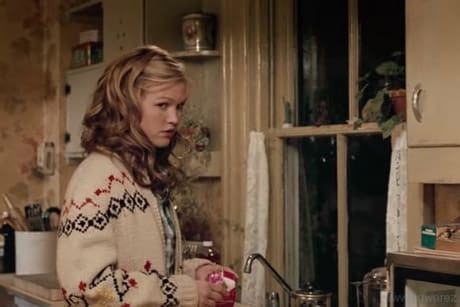The Cry of the Owl is an odd one, based on the Patricia Highsmith novel previously made into a feature-length film by esteemed French director Claude Chabrol back in 1987. It's not an easy one to tackle, delving into themes of image presentation, moral monstrosity and remaining powerless to dark impulses as a projection of personal neuroses and self-hatred. And it would be easy to dismiss this visibly flawed adaptation by simply noting the gaps and miscasting, but there's something very intriguing here, and there's a lot more thought behind the awkwardness than meets the eye.
Here, the original story is updated and moved to North America, with Paddy Considine stepping into the role of Robert Forrester, a recently separated man with self-esteem issues that regularly chooses the dark path (a crossroads visual representation in the film) to spy on Jenny (Julia Stiles), a complete stranger, in her home. More curious than his interest in her as a vessel of normalcy and contentment, rather than object of desire, is her reaction when she finds him peeping. She invites him in for tea.
What escalates this peculiarity is that she ups the stakes, showing up at his workplace the next day, and everywhere else he goes, looking actively to engage in his life as a romantic interest. Meanwhile, his ex-wife Nickie (Caroline Dhavernas) subjects him to manic episodes and his best friend Jack (Gord Rand) makes latent homosexual advances.
This bizarre mixture of oddball characters and sense of impending doom remains vital throughout, even if many of the scenes come off as clumsy and stilted. There's almost a Mulholland Drive aspect to this awkwardness, intentional or not, which nearly adds to the overall appeal. What suggests that it wasn't intentional is the fact that every scene with Julia Stiles works quite well, mainly because she gives a little more to her character than the others.
Deeply flawed and occasionally perplexing, this tale of manifested repression communicates its point of looking at others to avoid looking at self, and is something I will likely watch again.
(E1)Here, the original story is updated and moved to North America, with Paddy Considine stepping into the role of Robert Forrester, a recently separated man with self-esteem issues that regularly chooses the dark path (a crossroads visual representation in the film) to spy on Jenny (Julia Stiles), a complete stranger, in her home. More curious than his interest in her as a vessel of normalcy and contentment, rather than object of desire, is her reaction when she finds him peeping. She invites him in for tea.
What escalates this peculiarity is that she ups the stakes, showing up at his workplace the next day, and everywhere else he goes, looking actively to engage in his life as a romantic interest. Meanwhile, his ex-wife Nickie (Caroline Dhavernas) subjects him to manic episodes and his best friend Jack (Gord Rand) makes latent homosexual advances.
This bizarre mixture of oddball characters and sense of impending doom remains vital throughout, even if many of the scenes come off as clumsy and stilted. There's almost a Mulholland Drive aspect to this awkwardness, intentional or not, which nearly adds to the overall appeal. What suggests that it wasn't intentional is the fact that every scene with Julia Stiles works quite well, mainly because she gives a little more to her character than the others.
Deeply flawed and occasionally perplexing, this tale of manifested repression communicates its point of looking at others to avoid looking at self, and is something I will likely watch again.




